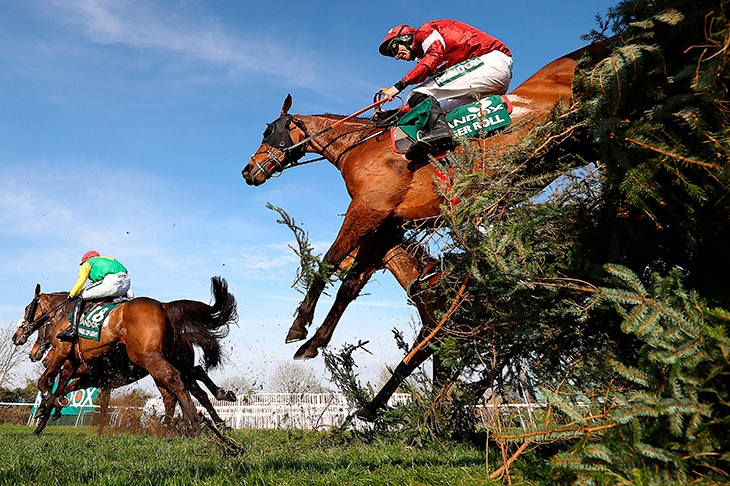On Grand National Day at Aintree this Saturday, the Rose Paterson Trust will be launched. This time last year, Rose was the chairman of Aintree, and had to cancel the meeting because of Covid. In June, she took her own life. The purpose of the trust is to help prevent such events. Owen, her widower, is very frank. He believes that: ‘If Rose had been aware of the utter catastrophe she has wrought — the first victim being herself — she would not have done it.’ The worst is that it cannot be undone. It is a wound that time can do frighteningly little to heal. He says it is wrong to think of suicide only as something committed by obviously lonely and depressed people. The urge can come upon people like Rose — beautiful, loved, admired, fulfilled in work, friendship and family, yet prey to terrible anxiety. This can act like ‘a heart attack to the brain’, and suicide, especially when encouraged by sinister how-to websites, can present itself as the answer. He and his family ask themselves every day how they could have failed to notice her deep worry, and how she, always so kind and concerned for others, did not imagine the pain her death would cause. As one of Rose’s close friends for more than 40 years, I can testify that we were the same. We knew she was a worrier, but we believed completely in her competence to triumph over her worries, as she so often did. We need to understand why we were wrong. Suicide awareness courses can tell you the warning signs — in others, and in yourself. The trust wants to help them, and the small charities which do so much local work in this area. As Owen puts it, every year in Britain, the equivalent of 15 jumbo jets full of people attempt suicide, and more than one in 20 ‘succeeds’. Every death is avoidable if the right help is in the right place at the right time. Donations can be made via rosepatersontrust.com.
It is lovely that Aintree is doing Rose proud. This week, the Randox Foxhunters’ Chase becomes the Rose Paterson Randox Foxhunters’ Chase, the best possible fit for someone who always encouraged the amateur. Rose did so much for Aintree, improving the fences and the washdown area essential for the health of hot horses after they finish. She civilised everything, persuading the tabloids to stop trying to find pictures of drunk Scousers and treat the magnificent Ladies’ Day more fairly. Rural and equestrian life are areas where stress — and therefore suicide — can be high. The custom is that people in that world do not own up to their problems. Rose may herself have been an example of that, so I hope it can be part of her legacy to help them. Remembering Rose, I often think of her on horseback. She had what riders call lovely hands.
So far as I could see, the Sunday Times this Easter Day contained no reference whatever to the fact that Easter is a religious festival — the most important day, indeed, in the Christian calendar. No Easter-related news story, feature or comment. Quite an achievement.
Following my criticism (Notes, 27 March) of Kew Gardens’ Manifesto for Change, which the director, Richard Deverell, introduced by speaking of how ‘parts of Kew’s history shamefully draw from a legacy that has deep roots in colonialism and racism’, I receive an interesting letter. J.F. Gordon, biographer of the ‘agitator, plant-hunter, forester’ Will Purdom, who was trained at the Royal Botanic Gardens at the end of the 19th century, points out that Kew had a deliberate policy of plant translocation in the name of ‘economic botany’. The idea was ‘to spread around the Empire plants which it was hoped would benefit parts of the world far from their native ranges’. The policy ‘wasn’t entirely altruistic’, but had real successes. One example was the translocation of the Cinchona tree from Peru to India, which enabled far cheaper and more ecologically sound production of quinine, vital against malaria. Another began with 70,000 Hevea (rubber tree) seeds brought from Brazil to Kew in 1876. About 2,700 of them germinated and were shipped to Ceylon (where they failed); to Burma; and to Singapore. In consequence of the last destination, says Mr Gordon, Malaysia is far better off today through the introduction of rubber as a commercial crop. In 1871, the director, Darwin’s great friend Sir Joseph Hooker, created Kew’s Mutual Improvement Society to help integrate botanical gardens throughout the Empire. As Mr Gordon puts it in his book: ‘The pronouncements of successive directors of Kew concerning the global network of botanists and horticulturalists which Kew effectively headed may have been distinctly self-satisfied, but they… were at the cutting edge of a discipline which was having a transformative impact on the world and on society in much the same way as was, say, engineering.’
One person annoyed by Kew’s woke disdain for such achievements is the billionaire Sir Henry Keswick, former owner of this paper and until recently a Kew trustee. He has written to Mr Deverell to complain. He was a very big donor to the gardens, but now says he will give no more: he is interested in plants and science, not in political campaigns. Mr Deverell has, in return, assured him that Kew’s coming ‘reinterpretation’ will involve no apologies, no censorship and no removals. I wonder what that means. Surely the reinterpretation itself is based on an apology — Mr Deverell’s earlier statement that Kew behaved ‘shamefully’ and that the gardens were ‘beacons of privilege and exploitation’. His statement also declared that ‘to stay silent is to be complicit’. It follows that when Kew speaks in the future, it will feel it must continue to grovel.
In last Saturday’s Daily Telegraph, the publication of the web address of Restore Trust, a new organisation dedicated to returning the National Trust to its ‘real mission’, got more than 6,000 people signing up as supporters. It might also interest Spectator readers: restore-trust.co.uk.
Got something to add? Join the discussion and comment below.
Get 10 issues for just $10
Subscribe to The Spectator Australia today for the next 10 magazine issues, plus full online access, for just $10.
You might disagree with half of it, but you’ll enjoy reading all of it. Try your first month for free, then just $2 a week for the remainder of your first year.















Comments
Don't miss out
Join the conversation with other Spectator Australia readers. Subscribe to leave a comment.
SUBSCRIBEAlready a subscriber? Log in